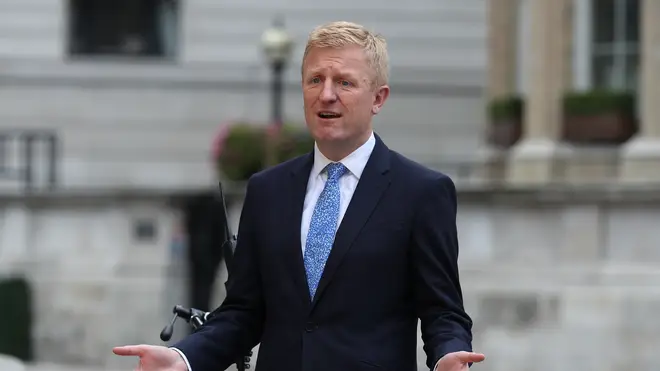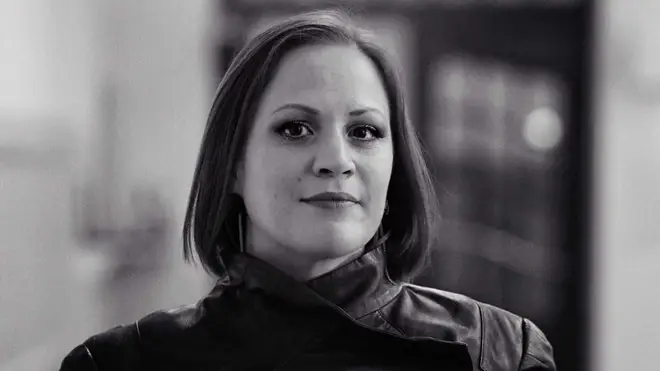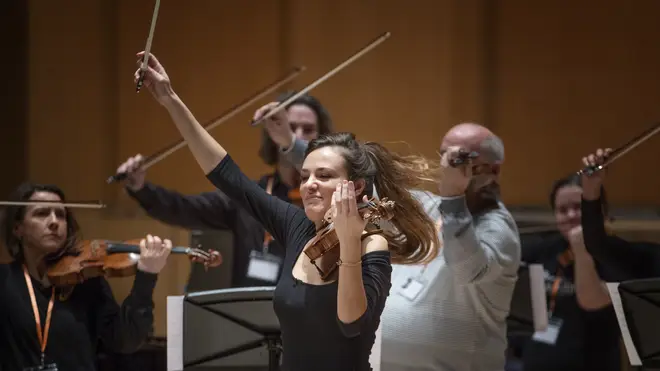On Air Now
Relaxing Evenings with Zeb Soanes 7pm - 10pm
12 October 2020, 13:08 | Updated: 12 October 2020, 13:11

Culture secretary Oliver Dowden’s advice for musicians and other artists to remain hopeful, rather than finding other means of employment, has sparked anger.
Culture secretary Oliver Dowden has said artists struggling in the face of the COVID-19 pandemic should “hang on in there for as long as they can.”
Speaking to Sky News today (Monday 12 October) as the first round of the £1.57bn arts pot was rolled out, Dowden said he hoped musicians and other artists should “hang on in there”, when asked if he thinks they should persevere or find alternative employment.
Dowden has just announced the first round of emergency funding for arts institutions, with the London Symphony Orchestra, Royal Liverpool Philharmonic and Birmingham Royal Ballet among the handful of halls and theatres receiving £257m of the survival fund. The funding is part of the £1.57bn package announced in the summer.
Read more: Birmingham Royal Ballet and LSO among arts institutions to receive £257m fund >

“Hang on in there? With what?,” mezzo-soprano Jennifer Johnston asks in response to Dowden’s comments. “We as freelancers cannot survive on fresh air alone. We have families to feed and roofs over our heads to keep,” Johnston told Classic FM.
“Clearly Dowden and his cabinet colleagues haven’t ever been on the breadline claiming universal credit, or using food banks.”
With concert cancellations continuing, and venues remaining closed in large numbers, the arts industry has been hit hard by the coronavirus pandemic.
Speaking to Classic FM’s sister station LBC recently, violinist Nicola Benedetti highlighted the plight of musicians. “So many people have been living in isolation and unbelievable worry since March, because they haven’t worked whatsoever.”
Read more: Tasmin Little warns of ‘cultural desert’ as 400 musicians join London protest >

Let Music Live protest on London's Parliament Square
The delay to funding distribution has meant that still-closed venues have struggled to justify keeping their staff. And when it comes to freelance musicians and workers, it’s even harder.
“Their plight is being left out,” Benedetti points out. “We want to see private and public sector working together better to implement the creative ideas that are safe and that work, and that we could be putting to use and we see across Europe but just aren’t being implemented. We could do a lot better than we’re doing now.”
Read more: Royal Opera House cuts entire team of casual staff >
Benedetti is not alone in fearing people will “have to leave the industry and leave the country” to continue working as musicians.
“We all know a musician that’s chosen to do one of those two things. And it’s tragic,” she says. “We need music to have hope, to keep our imagination alive and to imagine and envisage a better future for ourselves. We need our creativity and our arts to be able to do that to the best of our ability. And I just don’t want to see that die.”
Mezzo Johnston points out the tangible contribution arts makes to the UK economy:
“We are a world-leading sector that in pre-COVID times brought in over £100 billion to the UK economy annually, over 100 times more successful economically than the fishing industry – yet fishermen aren’t being told they are unviable and need to retrain.”
Read more: Musicians express fury as arts jobs not ‘viable’ in COVID-19 economy >

Dowden’s comments come after the chancellor Rishi Sunak contradictorily seemed to suggest that struggling musicians should “get another job” in line with the list of viable jobs he outlined in the new “COVID economy”.
The culture secretary described the funding announced today as “a vital boost for the theatres, music venues, museums and cultural organisations that form the soul of our nation”.
He continued: “It will protect these special places, save jobs and help the culture sector’s recovery.”
Read more: Arts world warns of ‘exodus of talent’ due to coronavirus >
Johnston feels more needs to be done, however. “We as a sector need more help than this bailout and the current arrangement for freelancers.
“We need the furlough scheme to continue, and for further Self-Employment Income Support Scheme (SEISS) grants to be given, including for those freelancers so far excluded from the government’s schemes, which is 40 percent of musicians.
“Most freelancers in the cultural sector have plenty of skills but are struggling in a tough employment environment to find other work. The current statistics are intimidating: for every job advertised, there are at least 500 people applying, most of whom will have relevant experience.”
📢 ARTS NEWS:
— Oliver Dowden (@OliverDowden) October 12, 2020
£257m to save 1385 theatres, museums, music venues and cultural organisations - the soul of our nation.
The biggest tranche of our Culture Recovery Fund yet, this will:
👥 protect jobs
🎭 restart performances
🎺create work for freelancers#HereForCulture pic.twitter.com/Pwr3U2bdNR
The Incorporated Society of Musicians’ chief executive, Deborah Annetts, added: “While we welcome funding from the government for the arts, today’s announcements are insufficient to stimulate a ‘cultural bounceback’.
“Arts venues and performers need support that makes it financially viable to reopen within social distancing safety requirements. That is why the ISM is campaigning with the Musicians Movement to #MakeMusicWork and calling for the creation of a new Freelance Performers Support Scheme.”
Classic FM has contacted the Department for Culture, Media and Sport for further explanation of the culture secretary’s comments.